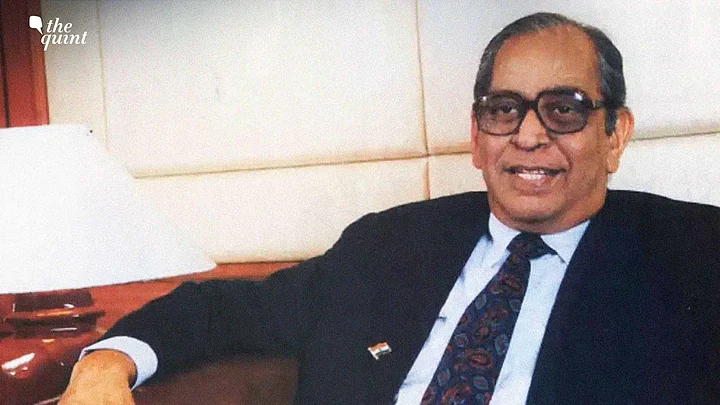Legendary Indian banker Narayanan Vaghul ’s recent passing away drew numerous obituaries and commentaries across platforms from people in the financial and corporate sector, elucidating on the 2009 Padma Bhushan awardee's contributions to not just defining the shape-and-form of India’s public and private banking sphere, but also in mentoring and guiding executives over the years, as a leader.
It was at the State Bank of India (which he had joined in 1955) where he came in close contact with the noted banker RK Talwar, former Chairman of the SBI, who played an important role in shaping him.
He then joined the National Institute of Bank Management (NIBM) where he was later offered the post of Director.
At the age of 39, Vaghul was offered the position of Executive Director at the Central Bank of India. In 1981, he became the youngest Chairman of the Bank of India at the age of 44.
Vaghul Was a Mentor and Friend to Many
My own understanding of Vaghul’s contributions to India’s financial sector was drawn from a reading of his 2023 book called Reflections, which he wrote at the age of 87, giving a detailed account of his experience at work.
His book used a refreshing format of story-telling—a series of anecdotes about his colleagues, politicians, bureaucrats, and clients, from his work years.
Vaghul was always known to be humble and this was quite evident from the book’s foreword itself. He wrote that he never imagined that his habit of making light-hearted conversation during the course of board meetings and afterwards at lunch would land him in the ‘trouble’ of writing the book.
During his tenure, Vaghul mentored many senior executives, including KV Kamath, who succeeded him and continued to build on his legacy.
Kamath, in a note to Mint, recalled his own recruitment to ICICI Ltd in 1996, while he was at the Asian Development Bank, noting Vaghul’s hands-off approach once he stepped down from his executive role.
Anand Mahindra, chairman of automotive major Mahindra Group, in a tweet, remembered how Vaghul had agreed to be the chairman of Mahindra World City in Chennai, when it was just taking shape as the first private sector Special Economic Zone (SEZ).
“At one point, I was told by consultants that we had created a white elephant and it would be wiser to shut it down or turn it into a CSR project. But he advised me never to lose conviction in something path-breaking," Mahindra posted on social media platform X.
Madan Sabnavis, chief economist at Bank of Baroda, who worked at ICICI Ltd’s economics department between 1987 and 1999, said Vaghul was extremely approachable.
So much so that even when employees significantly junior to him were having trouble finding a home in Mumbai, he would request the human resources personnel to step in and help.
“His doors were always open to us and he passed down a culture at the institution that discouraged seniors from berating subordinates. He was extremely accommodating of his colleagues," said Sabnavis.
One can read S Raman’s Business Standard column here for his reference to Vaghul and how he transformed his (Raman’s) life.
Raman, a former CMD, Canara Bank & Whole Time Member, SEBI, recounts how, despite holding a Bachelor of Commerce, Vaghul’s knowledge and curiosity about applying technology in banking were ahead of his time.
With the upcoming launch of satellite INSAT 1B, Vaghul envisioned how the Bank of India and the broader banking system could benefit, predating similar strategies by large international banks.
A Visionary in Banking and Leadership
Known for his simplicity, Vaghul once visited the ECIL in Hyderabad to discuss matters with the Chairman. He requested only a car and driver for the visit, reflecting his unpretentious nature. Raman sporadically stayed in touch with Vaghul, who became his idol.
Vaghul’s approach to leadership and innovation deeply influenced him and many other executives (before and after him).
One of the other lesser-known qualities about Vaghul was the way he constantly nurtured and supported the leadership of women during his time in the banking sphere. The ICICI group too had many women CEOs like Kalpana Morparia, Chanda Kochhar, and Shikha Sharma.
When Prime Minister Rajiv Gandhi was made aware of Vaghul’s talents, he got him into ICICI.
Following financial liberalisation in 1991, many financial conglomerates emerged, yet Vaghul indisputably spearheaded this movement. Institutions like the IDBI, UTI, and SBI, all diversified into various sectors of financial services, drawing inspiration from ICICI's Vaghul-crafted strategy.
It was Vaghul who introduced the concept of credit rating in the country and in 1987 established CRISIL (Credit Rating Information Services of India Ltd). He also laid the foundation for a new era in Indian banking through the universal banking model catering to the needs of the country.
His work ethic was deeply inspired by the nature of spiritual discipline Vaghul maintained and developed from early days of practicing yoga and Vipassana. This reinforced his views (and actions) on philanthropy too, which he saw as an act of service that beyond giving anyone a cheque or money.
Beyond banking, he founded Pratham, one of the country’s largest NGOs working in primary education. Pratham’s ASER studies and reports are an invaluable contribution on understanding and studying the state of education across urban and rural areas across India.
(Deepanshu Mohan is Professor of Economics, Dean, IDEAS, Office of Inter Disciplinary Studies, and Director, Centre for New Economics Studies (CNES), OP Jindal Global University. He is a Visiting Professor at the London School of Economics, and a 2024 Fall Academic Visitor to the Faculty of Asian and Middle Eastern Studies, University of Oxford. This is an opinion piece and the views expressed above are the author’s own. The Quint neither endorses, nor is responsible for them.)
